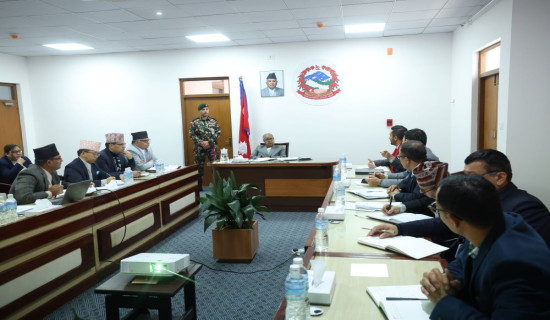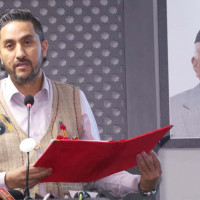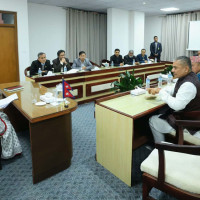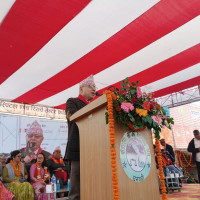- Tuesday, 9 December 2025
Endless Pursuit Of Power And Glory
Over the past couple of months, Nepali media have been abuzz with a controversial question – whether an erstwhile president can be involved in party politics or not. Not surprisingly, political actors are divided into two schools of argument, raising their voices for and against the issue, al-beit with weak arguments and inadequate evidence. While some argue that any independent citi-zen, once they return to civilian life from a once responsible state position, can be involved in the active politics of a particular party, others counter-argue that this is against the fundamental prin-ciples of democracy and political ethics, as well as the values and norms that are beyond partisan politics. Neither of the arguments can be negated without valid reasoning and ample evidence.
Surprisingly, however, novice political actors and some individuals in professional positions are involved in such a controversial issue, making it even more complicated. Each of the argumenta-tive schools involved in this debate should be aware that the issue is as attention-grabbing as it is inconclusive.
Arguments without serious study are futile and lead nowhere. This author has no intention to persuade the public to take a side. Being aware of the implications of a neutral posi-tion in a critical analysis, some valid arguments on the issue can be presented to the public for their perusal.
Glory and power
Among others, we should consider a point: who is glorious and who is powerful? Someone might argue that the two terms have almost the same meaning and are thus interchangeable. If we ex-amine their meaning more closely, we can see that they differ. A film star, for instance, may be glorious, but a police officer is powerful. When the latter says, the former is under arrest, the van-ity of being glorious is no longer effective. Simple though this example looks, it is more than enough to suggest that power is more important than glory. Someone else might still argue that the desire for glory and lust for power are a matter of individual choice. This appears to be a val-id argument on the surface, but beneath it lies a deep-seated desire for power.
If I am not mistaken, seeking power is a fundamental human desire different from other non-human creatures, who have no other desire than food, sleep, and shelter. When a tiger, for in-stance, has a meal, he sleeps with satisfaction until he is hungry for another meal. Human beings are superior to them only in one sense, that they seek power not only to enjoy it for pleasure but also to use it for the profitable use of the public good. In this respect, their attempts to get to power are by no means comparable to an ulterior motive.
Bertrand Russell (1872-1970) brilliantly mentioned this issue in a speech on the occasion of being awarded the Nobel Prize in 1950. As an eminent critic of the twentieth century, and probably of all time, he made interesting statements about glory and power. He argues that humans have an inherent desire for power. Love of power is akin to vanity, which is by no means true. What vani-ty needs for satisfaction is glory. Citing an example from Great Britain, he argues King has more glory than power, but the prime minister has more power than glory. He says, “Many people pre-fer glory to power, but on the whole these people have less effect upon the course of events than those who prefer power to glory.” In this respect, power is more important than glory. What Rus-sell said more than seven decades ago remains relevant today, just as it was when he delivered it.
Russell cited the instance from Britain, where the King was essentially constitutional, seeking no power to enjoy. But ours is different. While the position of a king is inborn, that of the president is a value-based cultural construct. We are well aware that the two sides are engaged in debate about the two individuals of high stature in Nepal at this juncture, sometimes implicitly and at other times explicitly. While one side claims that being involved in party politics even after re-tirement from a reverent position is legal, and therefore equally political, the other side counters that it is more an ethical and value-based matter than a political one.
Neither of the two arguments can be denied. Still, we can deduce that both arguments contain the desire for power in the undercurrent. To argue that a president can transform into an apolitical being once they ascend to the position of president is as fallacious as arguing that the same per-son can do better if given a chance to get to the powerful position of being the prime minister in the future. I may be criticised for portraying the two towering personalities as driven by a desire for power more than anything else; nevertheless, it is essential to refute the flawed arguments that they are devoid of the desire for power.
Power of discourse
The power of discourse plays a vital role in persuasion. Both schools are trying to persuade the public that their claims are valid. Regardless of who produces a discourse, it has an impact on the audience. Norman Fairclough (1989) argued that there is a close connection between discourse and power. An influential person produces discourse to gain and maintain power. The essence of his argument was that a discourse has power, but it gains even more power when it is made by a person in a position of power. It is thus natural that when a person of high stature, such as a pres-ident or prime minister, says something, that discourse generates more power than a statement made by a layperson. His observations about the power of discourse remain applicable even three decades later.
However, there is one thing that each of them should be aware of in essence: no one can be the judge of one’s own actions; they should instead be closely observant of how others see them. If we trust in people who are supposed to be the ultimate judges of the political actors, why not put the political aspirants to the ordeal of an election?
(The author is the chairman of Molung Foundation. bhupadhamala@gmail.com)
















